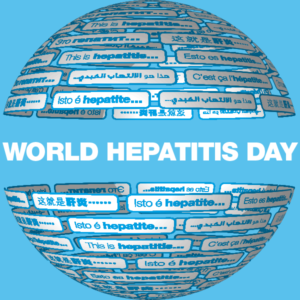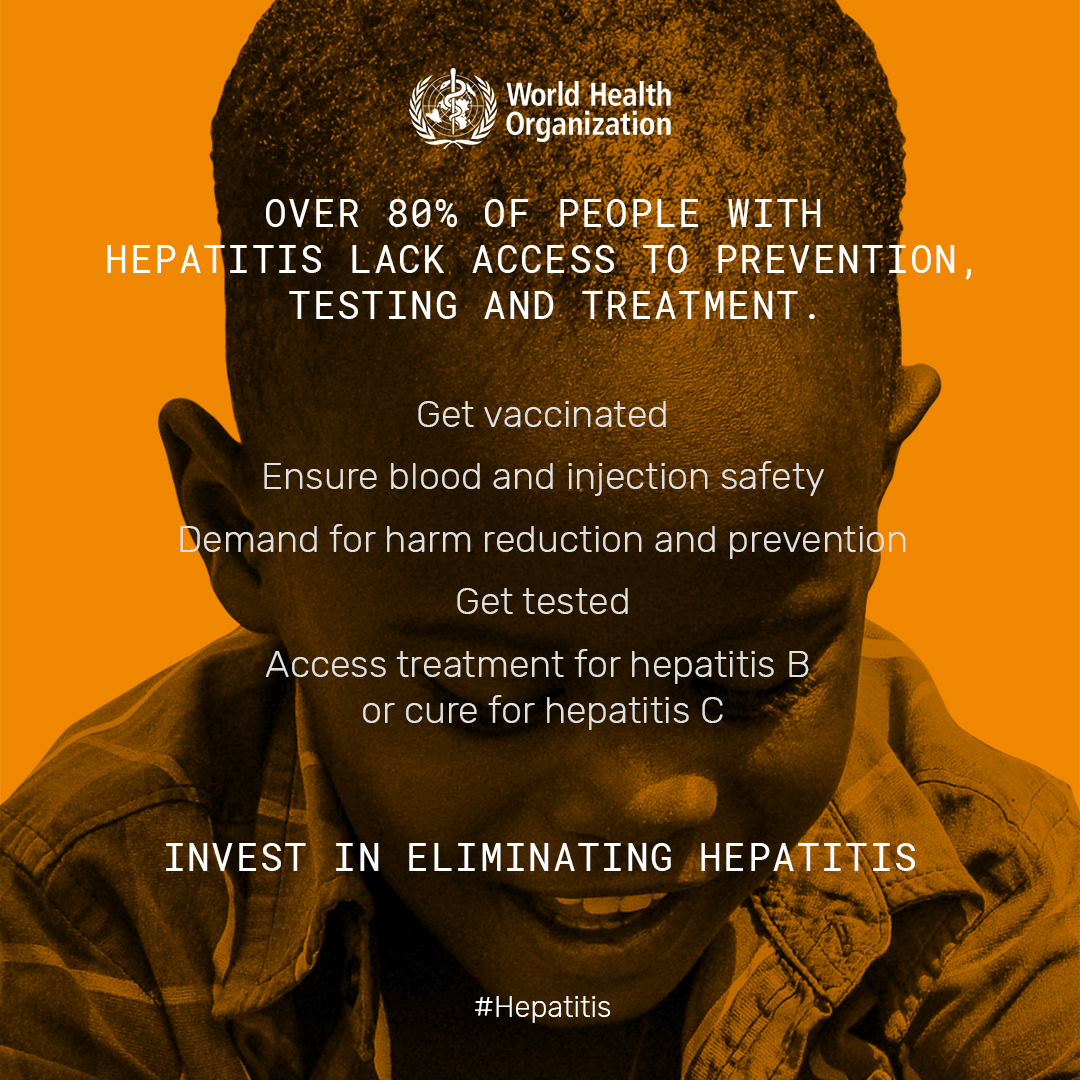Posts Tagged ‘World Hepatitis Day’
World Hepatitis Day is on July 28. By Our Student Pharmacist, Torie VonSeggern.
World Hepatitis Day is celebrated on July 28 to raise awareness about hepatitis, a variety of liver diseases, which affect people all over the world.
July 28 is the birthday of Dr. Baruch Blumberg who discovered hepatitis B in 1967 and developed the first hepatitis B vaccine.
What is Hepatitis?
Viral hepatitis is a group of infectious diseases, hepatitis A, B, C, D, and E, that cause both short-term and long-term liver disease. These diseases cause more than one million deaths per year and deaths have continued to increase over the years.
Different Types of Hepatitis
Hepatitis is commonly spread through ingestion or contact with a contaminated substance with one of the five viruses. Each virus is different and different steps can be taken to protect and treat each virus.
Hepatitis A – Hepatitis A Virus (HAV)
- Found in stool and blood and is very contagious
- Spread by ingesting virus from contaminated food or drink
- Symptoms: fatigue, nausea, stomach pain, and jaundice (yellowing of skin/whites of eyes)
- Short-term, typically less than 2 month duration
- Vaccine preventable
- Treatment includes rest, hydration, and proper nutrition
Hepatitis B – Hepatitis B Virus (HBV)
- Found in blood, semen, or other body fluids
- Spread via sexual contact, sharing injectable equipment, mother to baby at birth
- Symptoms: fatigue, poor appetite, stomach pain, nausea, and jaundice
- Typically short-term, but can become long-term; risk is based on age: 90% of infants become chronic and 2-6% of adults become chronic
- Vaccine preventable
- Treatment includes rest, hydration, and proper nutrition; medically monitoring of liver function is important
Hepatitis C – Hepatitis C Virus (HCV)
- Found in blood
- Spread via blood, most commonly through shared injectable equipment
- No symptoms; symptoms tend to be a sign of advanced liver disease
- Short-term initially, but 50% of patients turn chronic without treatment
- No vaccine; prevent by avoiding behaviors and getting tested
- Treatments available can cure a patient in 8 to 12 weeks
Hepatitis D – Hepatitis D Virus (HDV)
- Found in blood or other body fluids
- Spread via contact with blood or fluids specifically in patient’s already infected with HBV
- Symptoms: Same as HBV; severe symptoms/serious illness can lead to life-long liver damage and even death
- Can be short-term or long-term
- No direct vaccine for HDV, but prevention of HBV prevents HDV
- There are no current treatments available, but new treatments are being tested
Hepatitis E – Hepatitis E Virus (HEV)
- Found in stool
- Spread via ingestion from contaminated drinking water, raw or undercooked pork, venison, wild boar meat, or shellfish
- Symptoms: fatigue, poor appetite, stomach pain, nausea, and jaundice; many people do not have symptoms at all
- Most people fully recover without complications, with the exception of immunocompromised patients
- No vaccine is available in the US
- Treatment includes rest, hydration, and proper nutrition
How to Prevent the Spread of Hepatitis
- Get vaccinated!
- Both hepatitis A and B have vaccines available and there is even a combined A and B vaccine. Vaccinating is the best way to protect yourself from hepatitis A, B, and D.
- Wash your hands!
- Both hepatitis A and E can be spread through contamination of food and water. Wash hands frequently, especially prior to preparing food.
- Drink purified water when possible!
- Both hepatitis A and E can be prevented by drinking purified, uncontaminated water. This is not typically a concern in the United States, but if traveling, and purified water is not available, try boiling the water prior to consumption.
- Get tested!
- Testing for hepatitis B and C is recommended in a variety of situations which include:
- Pregnant women
- People who inject drugs
- People with HIV
- People with abnormal liver tests or liver disease
- People with end-stage renal disease
- Known exposure
- Hepatitis B: Men who have sex with men, people born outside of the US and not vaccinated, or people with hepatitis C
- Hepatitis C: received blood or organs before July 1992, clotting factor before 1987, or people with hepatitis B
- Testing for hepatitis A, D, and E is only recommended if you are experiencing symptoms. Your health-care provider will determine if a test is appropriate based on symptoms.
- Testing for hepatitis B and C is recommended in a variety of situations which include:
There are many places to get vaccinated and tested. Vaccines are available at your local pharmacy including Plain City Druggist and Happy Druggist Pharmacy, your doctor’s office, or other local healthcare centers. Testing is also available at most doctor’s offices or healthcare centers.
Please visit https://www.columbus.gov/publichealth/programs/Hepatitis-Testing/ for more information on testing within Columbus.
Coming Soon: Happy Druggist Pharmacy on Karl Road will be providing Hepatitis C testing in the near future. Watch for updates on an upcoming community outreach event coming soon!
References
- A Quick Guide to Hepatitis. OnHealth. https://www.onhealth.com/content/1/hepatitis_causes_treatment Published March 15, 2022. Accessed July 22, 2022.
- Hepatitis: The Silent Killer. Health Plus. https://www.parkwayeast.com.sg/healthplus/article/hepatitis-silent-killerPublished December 6, 2018. Accessed July 22, 2022.
- The ABC’s of Hepatitis: Know and Fight the Viral Disease. Mindray. https://www.mindray.com/en/media-center/blogs/the-abc-s-of-hepatitis-know-and-fight-the-viral-disease Published July 28, 2017. Accessed July 22, 2022.
- Viral Hepatitis A Q&As for the Public. Centers for Disease Control and Prevention (CDC). https://www.cdc.gov/hepatitis/hav/afaq.htm Accessed July 25, 2022.
- Viral Hepatitis B Q&As for the Public. Centers for Disease Control and Prevention (CDC). https://www.cdc.gov/hepatitis/hbv/bfaq.htm Accessed July 25, 2022.
- Viral Hepatitis C Q&As for the Public. Centers for Disease Control and Prevention (CDC). https://www.cdc.gov/hepatitis/hcv/cfaq.htm Accessed July 25, 2022.
- Viral Hepatitis D Q&As for the Public. Centers for Disease Control and Prevention (CDC). https://www.cdc.gov/hepatitis/hdv/dfaq.htm Accessed July 25, 2022.
- Viral Hepatitis E Q&As for the Public. Centers for Disease Control and Prevention (CDC). https://www.cdc.gov/hepatitis/hev/efaq.htm Accessed July 25, 2022.
- World Hepatitis Day. Centers for Disease Control and Prevention (CDC). https://www.cdc.gov/hepatitis/awareness/worldhepday.htm Reviewed July 19, 2021. Accessed July 22, 2022.
- World Hepatitis Day – July 28, 2022. National Today. https://nationaltoday.com/world-hepatitis-day/ Accessed July 22, 2022.
- World Hepatitis Day 28 July. World Hepatitis Day. https://www.worldhepatitisday.org/ Accessed July 22, 2022.
World Hepatitis Day is July 28. By Our July Student Pharmacist, Ray Chu.
In observance of World Hepatitis Day, which is July 28 this year, I wanted to spread awareness by answering some common questions about hepatitis.
Some fast trivia: Did you know there are currently five different kinds of hepatitis recognized? Hepatitis A, B, C, D, and E. The most common ones in the US are A, B, and C.
What is hepatitis?
Hepatitis describes inflammation of the liver and most often is referring to viral hepatitis caused by one of the hepatitis viruses. Depending on which virus, a person’s hepatitis will be classified A through E. Due to inflammation, the liver will not work as well. Drugs and toxins will not be filtered out of the body as well as with a normally functioning liver. Also, any activity that would stress or damage a normally functioning liver (such as drinking alcohol or taking certain medications) will affect a liver with hepatitis even more, worsening the condition.
It is estimated that 4.4 million Americans are living with chronic hepatitis.
Sounds dangerous, should I avoid people who have hepatitis?
Not at all. It is perfectly safe to be around someone with hepatitis. You cannot contract viral hepatitis by casual contact, so you can shake hands with, hug, or even kiss someone with hepatitis safely without danger of infecting yourself.
How is hepatitis spread and what preventative measures can be taken?
Hepatitis is spread differently depending on which virus we are talking about.
- Hepatitis A Virus (HAV)
- HAV is spread person to person by the fecal-oral route, mainly by eating or drinking food or water that has been contaminated by the feces of an infected person.
- Basic hand washing with soap and water following bowel movements and before handling food and drinks will reduce the incidence of Hepatitis A.
- Hepatitis B Virus (HBV)
- HBV is a bloodborne viral infection that is mainly spread through sexual contact with an infected person, mother to child during childbirth, and by contact with the bodily fluids of an infected person.
- Avoid sharing personal items such as toothbrushes, razors, nail clippers, and needles with an infected person.
- Hepatitis C Virus (HCV)
- HCV is spread primarily though contact with an infected person’s blood.
- To a lesser degree, it can also be spread though sexual contact and childbirth.
- Much like HBV, avoid sharing personal items with an infected person that may come into contact with infected blood.
- Hepatitis D Virus (HDV)
- HDV is also spread through contact with infected blood, but only in people already infected with HBV.
- If you do not have HBV, you will not contract HDV; therefore, all precautions for HBV will also help lessen the chance of HDV.
- Hepatitis E Virus (HEV)
- HEV is a relatively newly recognized disease.
- It is spread though food or water contaminated with the feces of an infected person.
- Some data suggests that pigs can carry HEV and, therefore, eating infected pork may transmit the infection.
- Consuming clean water only and avoiding contaminated foods will lower your chances in getting infected with HEV.
Are there any treatments available for hepatitis?
- Hepatitis A
- There is a vaccine available starting as young as 12 months old and is a regimen of three injections over one year. The immunity provided by the vaccine lasts at least 20 years.
- Full recovery of all HAV infections is expected in 99% of all patients.
- HAV usually resolves on its own over several weeks.
- Chronic hepatitis usually does not result from an HAV infection.
- Hepatitis B
- There is a vaccine available for HBV starting as young as two months old and is a regimen of three injections over a year and a half. The immunity is expected to last at least 15 years.
- If infected, 98% of acute HBV infected individuals clear the virus within 6 months without medication intervention.
- For those that develop chronic hepatitis, antiviral medications are available to suppress the HBV, but will not cure HBV completely.
- Hepatitis C
- There are NO vaccines available to protect against HCV at this time.
- Preventative measures are the first line of defense. Do not share personal hygiene items with an infected person.
- Antiviral medications are available to suppress HCV proliferation for those who develop a chronic infection.
- Hepatitis D
- Protecting yourself against HBV will also protect you against HDV. Receiving the HBV vaccine will also protect you from getting HDV.
- All of the same precautions for HBV will also protect you from getting HDV.
- Treatments for HDV are available, but are only beneficial to a small portion of patients.
- Hepatitis E
- There are no available vaccines for HEV.
- HEV usually resolves on its own over several weeks to months.
- If it does not resolve, immunosuppressive therapies exist to reduce the amount of damage done to the liver.
Want more information?
Please stop into any of our locations to learn more about the vaccines available for hepatitis or even if you just have a couple questions for us regarding the disease.
Some websites where you may find more information are:
https://hepatitisfoundation.org
https://www.who.int/features/qa/76/en/
https://www.cdc.gov/hepatitis/index.htm






